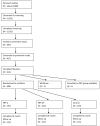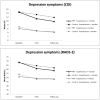Evaluation of a group cognitive-behavioral depression prevention program for young adolescents: a randomized effectiveness trial
- PMID: 22889296
- PMCID: PMC4469079
- DOI: 10.1080/15374416.2012.706517
Evaluation of a group cognitive-behavioral depression prevention program for young adolescents: a randomized effectiveness trial
Abstract
Depression is a common psychological problem in adolescence. Recent research suggests that group cognitive-behavioral interventions can reduce and prevent symptoms of depression in youth. Few studies have tested the effectiveness of such interventions when delivered by school teachers and counselors (as opposed to research team staff). We evaluated the effectiveness of the Penn Resiliency Program for adolescents (PRP-A), a school-based group intervention that targets cognitive behavioral risk factors for depression. We randomly assigned 408 middle school students (ages 10-15) to one of three conditions: PRP-A, PRP-AP (in which adolescents participated in PRP-A and parents were invited to attend a parent intervention component), or a school-as-usual control. Adolescents completed measures of depression and anxiety symptoms, cognitive style, and coping at baseline, immediately after the intervention, and at 6-month follow-up. PRP-A reduced depression symptoms relative to the school as usual control. Baseline levels of hopelessness moderated intervention effects. Among participants with average and high levels of hopelessness, PRP (A and AP) significantly improved depression symptoms, anxiety symptoms, hopelessness, and active coping relative to control. Among participants with low baseline hopelessness, we found no intervention effects. PRP-AP was not more effective than PRP-A alone. We found no intervention effects on clinical levels of depression or anxiety. These findings suggest that cognitive-behavioral interventions can be beneficial when delivered by school teachers and counselors. These interventions may be most helpful to students with elevated hopelessness.
Trial registration: ClinicalTrials.gov NCT00360451.
Figures





References
-
- Abela JRZ. The hopelessness theory of depression: A test of the diathesis-stress and causal mediation components in third and seventh grade children. Journal of Abnormal Child Psychology. 2001;29:241–254. - PubMed
-
- Abela JRZ, Aydin C, Auerbach RP. Operationalizing the “vulnerability” and “stress” components of the hopelessness theory of depression: A multi-wave longitudinal study. Behaviour Research and Therapy. 2006;44:1565–1583. - PubMed
-
- Abela JRZ, Aydin CM, Auerbach RP. Responses to depression in children: Reconceptualizing the relation among response styles. Journal of Abnormal Child Psychology. 2007;35:913–927. - PubMed
-
- Abela JRZ, Brozina K, Haigh EP. An examination of response styles theory of depression in third- and seventh-grade children: A short-term longitudinal study. Journal of Abnormal Child Psychology. 2002;30:515–527. - PubMed
-
- Abela JRZ, Gagnon H, Auerbach RP. Hopelessness depression in children: An examination of the symptom component of the Hopelessness Theory. Cognitive Therapy and Research. 2007;31:401–417.
Publication types
MeSH terms
Associated data
Grants and funding
LinkOut - more resources
Full Text Sources
Medical
Research Materials
